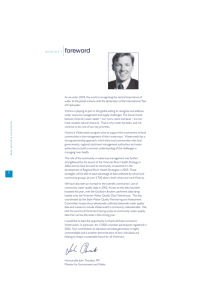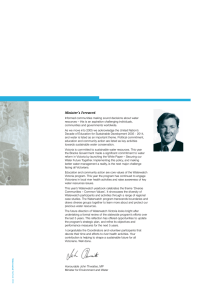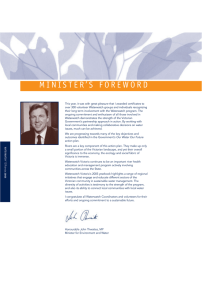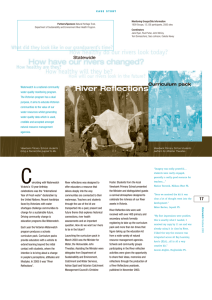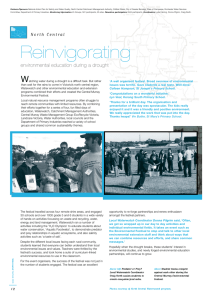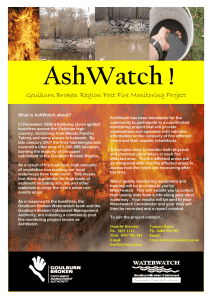2006/07 Statewide
advertisement
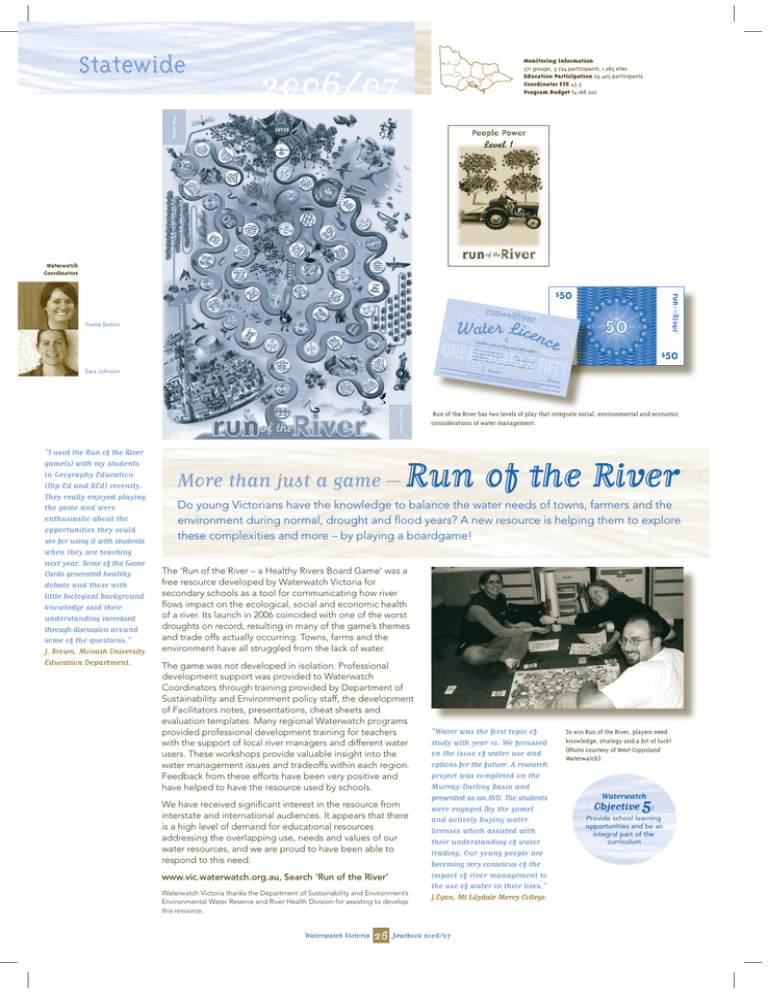
Statewide Monitoring Information 571 groups, 3 724 participants, 1 285 sites Education Participation 113 405 participants Coordinator FTE 43.3 Program Budget $4 168 202 2006/07 Waterwatch Coordinators Yvette Bettini Sara Johnson Run of the River has two levels of play that integrate social, environmental and economic considerations of water management. “I used the Run of the River game(s) with my students in Geography Education (Dip Ed and BEd) recently. They really enjoyed playing the game and were enthusiastic about the opportunities they could see for using it with students when they are teaching next year. Some of the Game Cards generated healthy debate and those with little biological background knowledge said their understanding increased through discussion around some of the questions.” J. Brown, Monash University Education Department. More than just a game – Run of the River Do young Victorians have the knowledge to balance the water needs of towns, farmers and the environment during normal, drought and flood years? A new resource is helping them to explore these complexities and more – by playing a boardgame! The ‘Run of the River – a Healthy Rivers Board Game’ was a free resource developed by Waterwatch Victoria for secondary schools as a tool for communicating how river flows impact on the ecological, social and economic health of a river. Its launch in 2006 coincided with one of the worst droughts on record, resulting in many of the game’s themes and trade offs actually occurring. Towns, farms and the environment have all struggled from the lack of water. The game was not developed in isolation. Professional development support was provided to Waterwatch Coordinators through training provided by Department of Sustainability and Environment policy staff, the development of Facilitators notes, presentations, cheat sheets and evaluation templates. Many regional Waterwatch programs provided professional development training for teachers with the support of local river managers and different water users. These workshops provide valuable insight into the water management issues and tradeoffs within each region. Feedback from these efforts have been very positive and have helped to have the resource used by schools. We have received significant interest in the resource from interstate and international audiences. It appears that there is a high level of demand for educational resources addressing the overlapping use, needs and values of our water resources, and we are proud to have been able to respond to this need. www.vic.waterwatch.org.au, Search ‘Run of the River’ Waterwatch Victoria thanks the Department of Sustainability and Environment’s Environmental Water Reserve and River Health Division for assisting to develop this resource. Waterwatch Victoria 26 “Water was the first topic of study with year 10. We focussed on the issue of water use and options for the future. A research project was completed on the Murray-Darling Basin and presented as an AVD. The students were engaged [by the game] and actively buying water licenses which assisted with their understanding of water trading. Our young people are becoming very conscious of the impact of river management to the use of water in their lives.” J.Egan, Mt Lilydale Mercy College. Yearbook 2006/07 To win Run of the River, players need knowledge, strategy and a bit of luck! (Photo courtesy of West Gippsland Waterwatch) Waterwatch Objective 5: Provide school learning opportunities and be an integral part of the curriculum W Coordinators receive training in data management. S A Waterwatch volunteer tests ‘mystery’ solutions during QA/QC Week. (Photo courtesy of West Gippsland Waterwatch) A record number of Coordinator and Volunteer participants were involved in Quality Assurance/Quality Control (QA/QC) Week 2006. This statewide event has been running since 1999, and is a self-assessment opportunity for monitors to show their monitoring proficiencies by testing ‘mystery’ solutions and by identifying ‘mystery’ bugs. This annual quality control check is an integral part of regional Data Confidence Plans, and complements training, equipment checks, record keeping and data management provided by regional Waterwatch programs. tatewide Waterwatch network meetings and training opportunities build the capacity of Waterwatch Coordinators to better inform, serve and support their local communities. This year Waterwatch Coordinators were connected up with state and national projects and priorities, including water policy (e.g. Environmental Water Reserve, Central Sustainable Water Strategy), projects (e.g. National willow identification and mapping workshops, early detection of aquatic weeds workshop, Estuarywatch) and research (Murray Darling Freshwater Research Centre macroinvertebrate studies, Land and Water Riparian Landscapes projects). aterwatch Victoria presented ‘Extinguishing Group Burnout! New Opportunities in water for Landcare’, at the 2006 International Landcare Conference. Ways that active Landcare groups could improve and expand their capacity to monitor and evaluate the effectiveness of their on-ground works (e.g. for erosion and salinity control) were identified. Monitoring of water quality and river health will connect these existing groups with river health managers, assist the integration of their activities with river health priorities and potentially improve their funding attractiveness. Waterwatch Objective 1: Increase community awareness, understanding and ownership of water issues and their relationship to catchment health The state Waterwatch office’s role is to support the Waterwatch Victoria Coordinator Network and to coordinate, develop and drive the program. These case studies demonstrate some activities that the state Waterwatch team coordinates or provides in order for the statewide program to meet its objectives, attract investment and maintain a strong, capable coordinator network. Waterwatching is one way that Landcarers can evaluate the effectiveness of their actions. Waterwatch Objective 3: Increase community involvement in water management decisions and gain community commitment to action in addressing waterway and catchment issues Other outstanding highlights and achievements Conference Papers presented at National Water Educators Network Conference, International Landcare Conference and VCE Environmental Science Teachers Conference. Regional Waterwatch Coordinators review project bids after receiving advice from state and federal government investors. QA/QC Week allows volunteer monitors to check that their techniques and equipment are working correctly. (Photo courtesy of West Gippsland Waterwatch) Waterwatch Objective 2: L ong-term investment in Waterwatch is vital for the program to maintain partnerships between communities and catchment managers. Waterwatch Victoria’s Regional Catchment Investment Plan (RCIP) training day established partnerships with state and federal government investors. Coordinators learned more about high-level river health priorities and tips to improve river health project bids. By reflecting on their regional programs strengths and weaknesses, in light of the regional investment cycle and river health priorities, Coordinators were able to identify ways to better engage and interact with catchment managers. Involve communities monitoring their local waterways to collect and provide data which is credible, accepted and used Partners/Sponsors Department of Sustainability and Environment, Cooperative Research Centre for Freshwater Ecology/E-Water CRC, Murray Darling Freshwater Research Centre, Marine Discovery Centre Department of Primary Industries. Waterwatch Objective 4: Establish and maintain effective partnerships between the community and catchment managers Photos courtesy of Waterwatch Victoria. Waterwatch Victoria 27 Yearbook 2006/07
